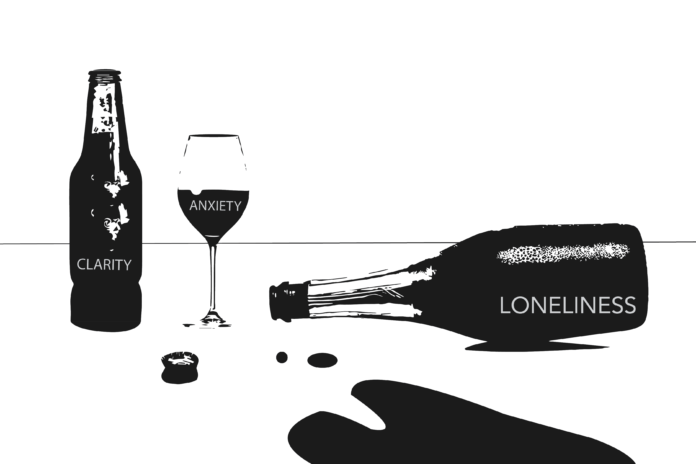College students share their experiences with sobriety
By LILI ARMSTRONG — features@ucdavis.edu
In a sea of red cups and beer pong tables, most don’t associate college years with sobriety. Drinking is a huge part of social life for many college students. Fresh out of the nest, it’s a common theme for college students to go wild with their newfound freedom and independence. That being said, plenty of people choose not to take this path. Whether it be for personal, health or lifestyle reasons, there are a number of university students who abstain from drinking.
One of these individuals is Jon Bunting, a third-year psychology major at UC Davis. Bunting has abstained from drinking and substances for the entirety of his college career due to health reasons. He received a liver transplant in 2018, and his doctors told him to refrain from consuming alcohol.
Sobriety hasn’t stopped him from continuing to socialize and have fun with friends, but it has come with its fair share of ups and downs.
“At first, there’s a huge sense of alienation that I had with some of my friends, where all of a sudden, it was really difficult for me to go into a lot of spaces,” Bunting said. “I didn’t seem as fun or as lively, especially with all these substances around.”
College students who don’t drink may often find themselves in a room where nobody else is sober as alcohol is a substance commonly used as a means of increasing sociability. According to a study published in the Journal of Studies on Alcohol and Drugs, the most commonly cited motive for alcohol consumption amongst college students is “social camaraderie.”
“When you lose that feature of alcohol, you know, that relaxed social state, I think there is a certain level of needing to fill that gap,” Bunting said. “Since you can’t get a little buzz on from drinking, you find a way to get comfortable quickly, so I think there is some level of getting to know yourself better because you can’t dodge that social anxiety as easily.”
Micah Organ, who graduated from Ohio State University with a degree in sociology, abstained from drinking and substances during college due to negative experiences with alcohol abuse among family members. Organ said being sober impacted her social life as a college student.
“I largely did not engage with the traditional party scene on my campus because I knew that I would not fit in as someone who did not drink or do drugs,” Organ said. “When I first started college and was trying to establish my friend group, people definitely judged me when I told them that I did not drink. I always felt like I needed to explain the details of my family’s negative relationship with drinking in order to justify why I didn’t do it myself.”
There are ups and downs to practicing sobriety in college, and a common theme among experiences is uncertainty in social situations.
Organ said she often felt pressured to drink, which discouraged her from participating in more traditional social settings.
A family history of substance abuse is a common reason for college students to remain sober. Ash Phommasa, a fourth-year psychological and brain sciences and applied psychology double major at UC Santa Barbara, didn’t feel comfortable drinking until her 22nd birthday. Due to her family’s relationship with alcoholism, she went into college with a mindset of full sobriety.
Phommasa said she is often met with surprise, and sometimes envy, when telling her peers she doesn’t drink.
“It was always like they found a diamond in the rough or some completely innocent, pure little human being,” Phommasa said. “I would always get the typical reaction of, ‘Wow! Could not be me, but it should be. I wish I was like you. I wish I could stop waking up with insane hangovers.’”
Phommasa also expressed that sobriety has shone a light on who her real friends are.
“These super understanding, super respectful people would carry on with the night, never pressuring me to drink or sticking up for me when people try forcing me into taking a shot, which makes me very, very anxious and panicky,” Phommasa said. “My friends always accommodate and get me juice, too. It’s really heartwarming to have people like this and my sobriety has been a way of figuring people out.”
Recent UC Davis graduate Ernest Walker has had varying experiences with a sober social life throughout college.
“Sobriety allowed me to be the caretaker when I went out with friends,” Walker said. “I also had to find healthy ways to deal with problems that arose in my life.”
Through sobriety, Walker discovered the escapism that went hand-in-hand with drinking and drug use.
“People tend to use those as a crutch, which opens the pathway to addiction,” Walker said. “There were also some situations where, if I decided not to be sober in those situations, things would’ve been dangerous for me.”
According to Organ and Bunting, although it might feel isolating at times, those who abstain from drinking or drug use are not alone.
“Remind yourself of why you are adhering to this lifestyle when times get hard,” Organ said. “I think that doing this may help you feel more confident in yourself and your decisions. The drinking culture in college is so extreme and is not representative of what life outside of college looks like in terms of social situations. So while things may be hard now, it won’t be like this forever.”
Written by: Lili Armstrong — features@theaggie.org




